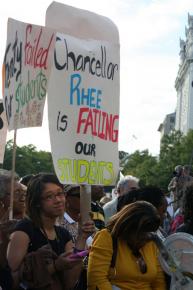The price of D.C. school cuts
reports on attacks on teachers and students at D.C. public schools.
THE FALLOUT continues from D.C. Public Schools (DCPS) Chancellor Michelle Rhee's latest attack on public education, and there are signs that more attacks are in store.
On October 29, Rhee appeared at a City Council hearing to answer for her Reduction In Force (RIF) tactic, in which she fired 388 DCPS workers in early October, including 266 teachers. Outrage over the job cuts was widespread, and even spilled into the hearings. This has exacerbated a split between Rhee and the City Council over summer school funding, which the council advised be cut before any layoffs were made.
Council Chair Vincent Gray hinted at criminal neglect on the part of Rhee and Schools Chief Financial Officer Noah Wepman, asking, "Why bother to have a legislative body if the people in the executive branch do whatever they choose because they don't like the decision of the legislative branch?"
This question has been on the minds of many in the community since Mayor Adrian Fenty dissolved the school board and consolidated power over D.C. public education in the hands of himself and Rhee.

Rhee stood by her decision, with the incredible claim that laying off teachers would have no effect on students. "I decided that, as unfortunate as the cut was, I'd rather see that cut happen to adults rather than children," Rhee said.
Does Rhee think that the many adults she fired do not have children--or that a student whose favorite subject is French is not affected when the class is no longer available?
THESE LATEST job cuts are already having a devastating impact. In certain schools, entire subjects will no longer be taught. Newer, inexperienced teachers will have to absorb a surplus of students, making it impossible for a healthy classroom environments to develop. At one high school in the Anacostia neighborhood, multiple special education teachers lost their jobs, meaning that the special education department is now made up almost entirely of first-year teachers from the Teach for America program.
Many of the individuals whose jobs were cut are Black teachers who were active in the Washington Teachers Union (WTU), whose contract was totally bypassed to implement the RIF. This has created a climate in which current DCPS teachers have been hesitant to go on record out of fear of reprisals from the chancellor.
As one teacher, who asked to remain anonymous, said, "In June, we will see if there really was a summer school budget crisis or if there were [other motives for the RIF]."
The WTU, despite calling a few small rallies and vigils, largely pursued a legal strategy of fighting Rhee in the courts to get the fired teachers' jobs back--a strategy that has now hit a wall. Just before Thanksgiving, the D.C. Superior Court ruled in favor of Rhee and against the WTU's lawsuit challenging the RIF.
Meanwhile, parents of students at Rose Hardy Middle School are concerned that their school might be next on the chopping block, after Rhee made public comments that she plans to "turn" the school. Of the 75 percent Black school, Rhee said, "It's not going to turn overnight, but I think the plan we're moving forward on is one that is really going to boost [the school as an] option. I think people will be incredibly pleased."
Yet according to last spring's standardized test scores, almost three-quarters of the school placed proficient or above in reading, and the fine arts and instrumental music program offered at Hardy is one of the best in the city. So many are wondering what the problem is, and what "plan" Rhee has in store.
Many Hardy parents and teachers feel that Rhee wants to change the demographic of a successful school to accommodate a small group of privileged parents. Keenan Keller, whose daughter attends seventh grade at Hardy, told the Washington Post, "If you're a civil rights lawyer, and you read that, you're asking, 'Turn from what to what? Turn from who to who?'"
Already, public education in D.C. is more restricted than most places in the country. Washington is second only to New Orleans in the spread of charter schools, with 36 percent of all students attending charters. Higher public education is under attack as well, with D.C.'s Southeastern University losing its accreditation after 130 years serving low-income and international students. Tuition at the University of the District of Columbia increased 100 percent over the past two semesters.
The methods and procedures used to privatize education in the district, where one in six union members are teachers, are a blatant attack on our basic rights. These changes should be seen as what they are: an aggressive strike at poor and working-class people's education and the unions that protect our teachers, who are provided little more than scraps to educate our youth.
The resistance of D.C. teachers, parents and students will be crucial to making sure that Rhee doesn't get her way, and that education remains public here in the nation's capital. We need to organize and unite against these injustices, and never forget that education is a right, not a privilege.


